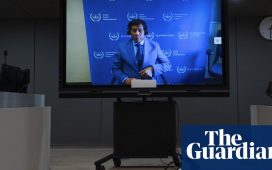
Pushing back a deadline for calling fresh Assembly elections in Northern Ireland is “legislating for further drift”, the Sinn Fein president has said.
Mary-Lou McDonald criticised the move by Northern Ireland Secretary Chris Heaton-Harris, and said there was a “real danger” of more drift amid the political deadlock.
Mr Heaton-Harris announced on Thursday that the local parties will have until January 18 2024 to form a ministerial executive at Stormont.
If that deadline passes, then the Government would come under a legal responsibility to hold a snap poll within the following 12 weeks.
During a round-table meeting between Mr Heaton-Harris and the Stormont parties in Belfast on Thursday, the political stalemate, the stalled Daithi’s Law on organ donation, a 2023-24 budget and protocol negotiations were discussed.
Mr Heaton-Harris said he was disappointed at having to introduce the legislation but said he was aware that many people in Northern Ireland are not in favour of another poll.
He said the legislation will also enable the Government to bring this period to an early end and move to elections sooner, if it becomes necessary.
“My priority remains the restoration of fully functioning power-sharing institutions and I will continue to work with the NI parties to ensure this happens as soon as possible,” he added.
The DUP collapsed the devolved Executive last February in protest at Brexit’s Northern Ireland Protocol, and the party has made clear it will not lift its block on powersharing until radical changes are made to the contentious Irish Sea trading arrangements.
The EU and UK are engaged in intensive negotiations amid mounting speculation that a deal is on the cards to reduce the red tape on trade between Great Britain and Northern Ireland.
However, an agreement between London and Brussels on the protocol would not necessarily lead to the return of powersharing, as the DUP has insisted any deal that may emerge must meet its tests on trade, sovereignty and accountability if it is to countenance re-entering Stormont.
With the powersharing vacuum having continued following last May’s Assembly election, several deadlines for the calling of another election have come and gone.
With the last one passing on January 19, the Government had been under a responsibility to call a poll within a 12-week timeframe. That duty will fall away following Mr Heaton-Harris’s move.
Civil servants are running public services in Northern Ireland in the absence of elected ministers.
They have taken the reins at a time when Stormont is facing a financial overspend running to hundreds of millions of pounds
DUP MLA Gordon Lyons reiterated his party’s position that they want concerns around the protocol addressed.
He contended that pushing back the deadline for Stormont elections was less important than resolving issues with the protocol.
“From our point of view, we don’t fear going to the electorate, we’re quite happy to get our mandate renewed. In fact, we think we’ll improve on the election results from last time,” he said.
“But ultimately, what we want to see sorted out is the protocol.
“Get it resolved in accordance with the seven tests that we’ve set out, which allow us to form that stable executive to deal with the issues that we’re facing.”
Ms McDonald criticised the DUP for its position, describing it as “unacceptable” that the party is preventing the formation of a new Stormont Executive.
She said Mr Heaton-Harris also expressed a “level of frustration” during the meeting over the ongoing deadlock.
“He tells us that he wishes to see the institutions re-established, we are prepared to take him on his word,” she said.
“I have described the decision to set the election deadline back to January as legislating for further drift, I think that’s a real danger.
“I hope I’m wrong in that, and I hope that the positive noises that we have been hearing in recent times actually amount now to a result – inclusive government back up and running again with the kind of budget that will be needed here to support health services, to support education, to support the infrastructural needs of this place, which are very significant.”
Ms McDonald also warned there can be no return to direct rule if the powersharing institutions are not resurrected.
“We’ll be looking at a partnership arrangement, joint authority, between Dublin and London,” she said.
“That’s the alternative and I think the DUP need to very soberly assess that prospect.”
The five largest parties at Stormont took part in the round-table meeting.
Alliance leader Naomi Long described a “very full and very frank exchange of views”.
She criticised the decision by Mr Heaton-Harris to push back the election deadline as “kicking the can down the road”.
“(If) there isn’t going to be an election and there isn’t going to be that kind of incentive for people to get together to form an executive, then a process needs to be created to start to deal with those issues,” she said.
UUP leader Doug Beattie described an interesting but frustrating meeting, “at times a little bit tetchy”.
He said his party still does not have all the information it requires to give positive ideas for a budget for 2023-24.
“We talked about the protocol … it was the same noises that we’ve heard before in that the negotiations continue, they are good negotiations, there is no deal yet. There are significant gaps still, they’re working away at absolutely no timeframe.”
Meanwhile, SDLP MP Claire Hanna said Mr Heaton-Harris had confirmed that the region’s economic future would include access to UK and EU markets.
She added: “On the economy we were pleased to get confirmation from the Secretary of State that he is clear that part of our economic future is dual market access and ensuring that is protected.
“We all know what that means in terms of some of the red lines that people have.
“We have advocated from the start decoupling the executive formation and the EU-UK trade deal.”
On Wednesday, the UK Supreme Court unanimously ruled that the Northern Ireland Protocol is lawful following a challenge brought by a collective of unionists and Brexiteers.
Unionists have interpreted the judgment as confirmation that the protocol has overridden a key plank of the 1800 Acts of Union that formed the United Kingdom.











